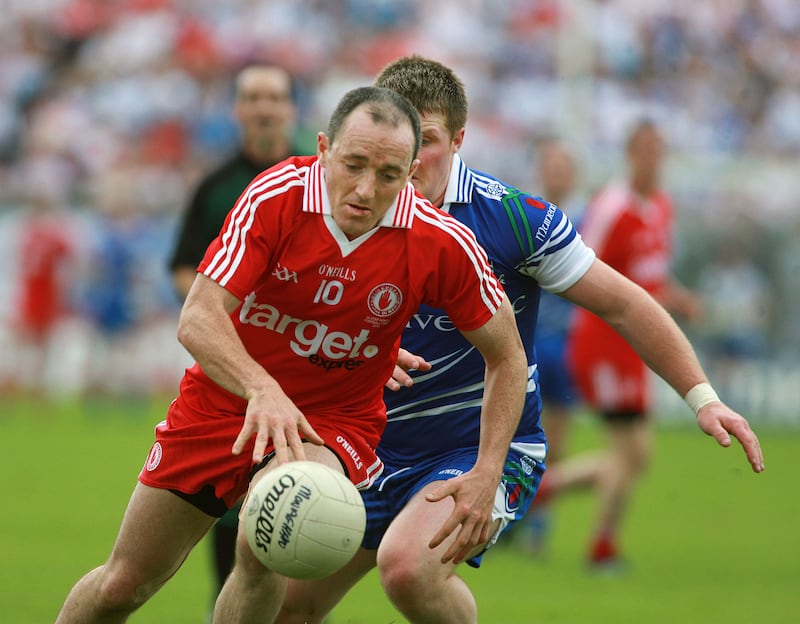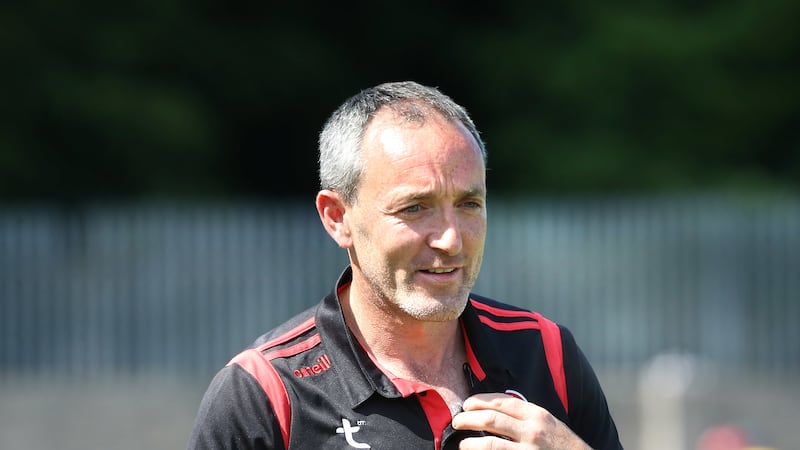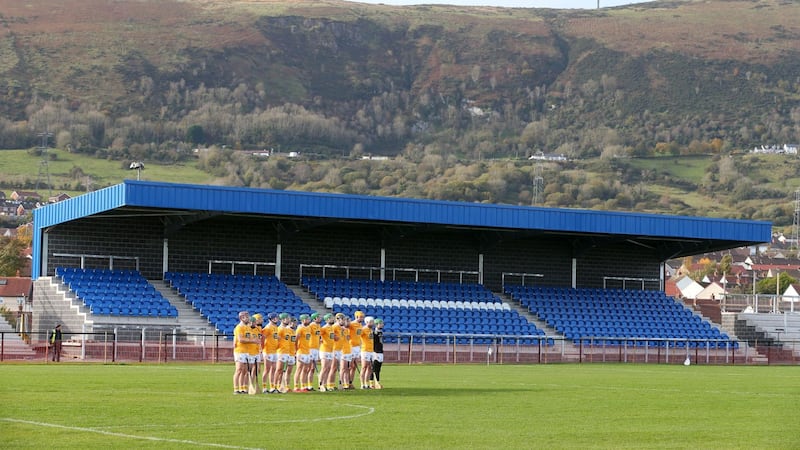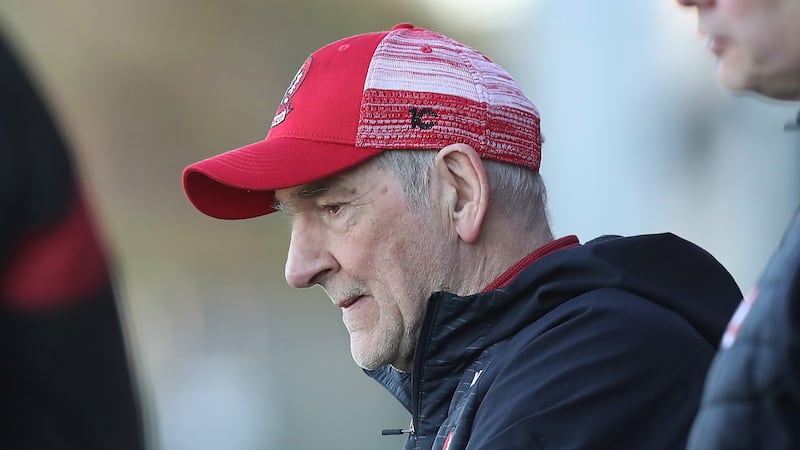IT’S two days before an All-Ireland final – the storyteller can’t quite remember which one – and Brian Dooher is out on call to a farmer in the townland of Altaghoney in Craigbane.
The day’s work is castrating bulls. One of them gets a leg free and fires off a kick.
“Caught him right in the you-know-where. He was clean out for the count, and these other boys thought he was dead,” says John Hood, the former joint-owner of what was then Claudy & Whitehouse veterinary clinic, where Dooher worked after qualifying.
“They said they’d have to get this boy sorted out and get him to hospital.
“He got up when he came around after a minute or two, he shook himself and he just carried on with what he was doing.
“I knew then he was a hardy b*****d.”
Standing in the black of night, the rain pouring somewhere on the rolling hillside terrain that ran between Claudy and Donemana, delivering calves by emergency Caesarean with only car headlights to help, this was no place for an inter-county footballer.
Times when he was on call, he could have gone three weeks without a proper night’s sleep.
“And on top of his day’s veterinary work, he was maybe the main vet at the Lifford dogs. But he never mentioned his work,” says Tony Donnelly.
“He never said ‘aw I’m tired after today’. You wouldn’t have known what he did. He arrived and when he was there, he put in everything.”
That’s the life he lived in his early years.
When he studied veterinary medicine at UCD, where he won a Sigerson Cup, they had seen very few like him.
In a panel show in 2019, Dooher was one of the guests honoured by the college for his achievements in both sporting and veterinarian fields.
From the floor stood up a successful businessman named Des Rice, who fulfilled the role of external examiner for the college for three years. In his last year, he encountered the Tyrone man.
“I never heard the like of him. There was never a question we asked him that he didn’t only know the answer to, but he knew it in-depth. If veterinary was secondary, his input into Tyrone football must have been absolutely amazing," said Rice.
Travelling up home for midweek training sessions in his final two years gave him a window in the chaos that trying to manage the two would become.
No sooner had Dooher stepped into practice just a few miles across the Sperrins border with north Derry than he was being earmarked.
John Hood recalls how the Chief Veterinary Officer at the time had ambitions for him, noting that he was ‘a good worker and made good decisions’.
Dooher himself recalled in a 2005 interview with The Irish Times how he would regularly have to do 80-hour weeks as a young vet.
“And that would be accepted - everyone in the practice was at the same,” he said, affirming his attitude that this was just what you did, and got on with it.
Work was never far from him. His father still farms yet. Built up on days in the bog at turf, Dooher farms himself too, keeping pedigree Texel sheep.
Those that predicted his rise early on weren’t far wrong.
He combines the farming now with the more sociable hours as the Deputy Chief Veterinary Officer for the Department of Agriculture.

He was praised as recently as two weeks ago by Aodhán Connolly, director of NI’s Retail Consortium, for his work in easing trade amid the testing Brexit process.
Facilitating the trade of meat produce has become a key part of his day job and Connolly spoke about Dooher’s “sterling work he has done being on call at all hours”, suggesting that it’s not as 9-to-5 as it’s painted.
Bear in mind that he’s now balancing all that against what many consider a full-time job in itself, co-managing the Tyrone footballers alongside Feargal Logan.
Some men just can’t be put down.
He was too young for the ’95 All-Ireland final but was straight in the following year, and despite his youth and his deceiving frame, the Meath men bloodied but didn’t bow him.
Whether Martin O’Connell’s studs met his head by accident or design, he was patched up and went back on in the image of Terry Butcher, the bandage reddening as the day’s events wore on.
That was in his career’s beginning and it was no different in its end.
Made of barbed wire and bone, he played until he was 36 despite the fact that he was hanging together by the end, riddled by one injury after the next.
“Enda McGinley, with his physio hat on, used to say ‘poor Dooher, God knows what state he’ll be in in his 40s and 50s’,” says Donnelly.
“He played through the pain barrier, played through injections, overcame so many different injuries – he was just a warrior who played and worried about the consequences later on, or maybe didn’t even. That’s how he achieved what he achieved.
“Funny, I told him there, he’s looking better now than ever he looked when he played! He’d turn up for a match and you’d think he hadn’t been fed in a fortnight!”
Brian McGuigan found out all about it in 2007. The Ardboe man had broken his leg and Dooher had cracked his kneecap ‘nearly in half’.
“We were coming back with [Tyrone physio] Louis O’Connor and doing the rehab together, and it was the most brutal training I ever done as a Gaelic footballer,” said McGuigan.
“We had to meet sometimes in Letterkenny or Cookstown because we had to go into Cryo baths straight after the sessions.
“They were good hour sessions and it definitely helped speed up my recovery because I didn’t want to be there any more at recovery sessions with Brian! It was worse than any training we did for Tyrone.”
What Dooher brought to the number 10 position was not only instrumental for Tyrone, but transformative to the way that others thought about the position.
“People often call it ‘the Dooher role’ now, and that’s some testament to him, that a position on the pitch became named after him. That says an awful lot too,” added Donnelly.
He’s something of a caged tiger now, stood on the line with Feargal Logan, his influence on proceedings limited to the thing he least liked as a player – telling others what to do when he wasn’t doing it himself.
Words were rare. He seldom spoke at any length, even when he was captain. His leadership style was to be the first man through the brick wall. Team-mates never hesitate to follow that.
Yet buried in the locker too was the like of that famous score against Kerry, using green-and-gold jerseys as launch pads to propel himself for 60 yards before unleashing a trademark shot.
Tyrone football has had its share of those who could float like the butterfly and plenty more that stung like the bee.
Few did both as well as Brian Dooher.








